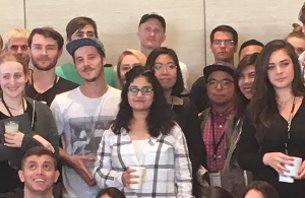
Can You Teach Entrepreneurship to Creatives?

The ad agency model is in flux and these days teams are
turning their hands to designing products and services for clients and
developing IP for themselves as well as creating those things that we might
consider traditional advertising. That means that ambitious young creatives
should be able to think as entrepreneurially as they do creatively.
But what, when you come down to it, is ‘entrepreneurial
thinking’, and can it be taught?
That was the topic of a highly unusual workshop at the London International Awards Creative LIAisons event in Las Vegas on Thursday. With the help of Professor Saras D. Sarasvathy of the University of Virginia and Shark Tank stars Daymond John and Kevin Harrington, 85 lucky young creatives got the chance to get to know their inner entrepreneur.

Champ Nichols, who heads up the speaking division at Daymond
John’s The Shark Group, introduced the morning by explaining the thinking
behind serving up this innovative workshop to adland creatives. “I know the traditional gravy trains have
stopped. The mark ups have stopped. You guys are being asked to do more with
more transparency in less time,” he said. “We’re not here to tell you the sky
is falling. I’m sure you’ve heard plenty of those speeches. You’re here to hear
from people who have learned to sail the seas of uncertainty.”
In the morning, Professor Sarasvathy gave an interactive lecture
on what she describes as the science of entrepreneurship. Over the past two
decades she has interviewed many of the world’s ‘expert’ entrepreneurs to
distil the decision making processes into identifiable, tangible steps. Where
most of us fall down is that we try and predict the future – build step-by-step
business plans, try to anticipate and overthink the unknown. Successful
entrepreneurs, on the other hand, are more concerned with making stuff happen,
co-create the future so that they don’t need to predict it. This, Professor
Sarasvathy, explained was ‘Effectual Logic’.
This idea of ‘Effectuation’ was further broken down into
five principles: assessing what resources you already have, figuring out how
much you can afford to lose on a venture, building a network of partners and
collaborators, adapting to surprises and then ‘piloting’ that project forward.
These principles are the result of years of extensive research and was, judging
by the frantic scribbling in the back row, as enlightening for the LIA judges
who snuck in the back of the room as it was for the young creatives.
Afterwards, the creatives were divided into teams of five to
come up with ideas to pitch to the two Shark Tank sharks – using the principles
outlined. The ideas were fleshed out and then put to vote – five were selected
for further work.
That afternoon Daymond John – founder and CEO of FUBU and
serial entrepreneur – and infomercial entrepreneur Kevin Harrington listened to
pitches from the winning groups and gave them a grilling. By giving them a gentler
version of the Shark Tank treatment, Daymond and Kevin guided the creatives
through a business assessment of their crazy but clever ideas. What sort of
revenue streams could their ideas generate? What kind of partnerships should
they seek out to start the process of making their ideas realities? How should
they protect their brand names and ideas? Might there be unexpected markets for
their ideas?
For creatives who were more used to selling communications
ideas to clients, it was an unprecedented opportunity to learn how they could
turn their creative powers to enterprises that could survive and thrive in the
real world.
From John Power (the poop-powered public rest room) to
Amplify (the sound-activated charger) and Bindr (the book-centric matchmaking
app), the ideas were varied and kept the two mega-entrepreneurs engaged (and in
some instances doubled over in laughter). For all the business smarts Daymond,
Kevin and the Professor imparted to the audience, the young creatives gave just
as much back in terms of their lateral thinking.
After the energising day’s activities ended, we spoke to
several young creatives who were energised not only at the prospect of bringing
this experience back to their agencies but also initiating more of their own
projects. “I feel excited… but I feel like I’ve got so much to do when I get
home!” laughed BMB London’s Harry Bootham.
You and us both Harry.
To learn more about Professor Sarasvathy’s research and
learning on entrepreneurship, head to Effectuation.org http://www.effectuation.org/















